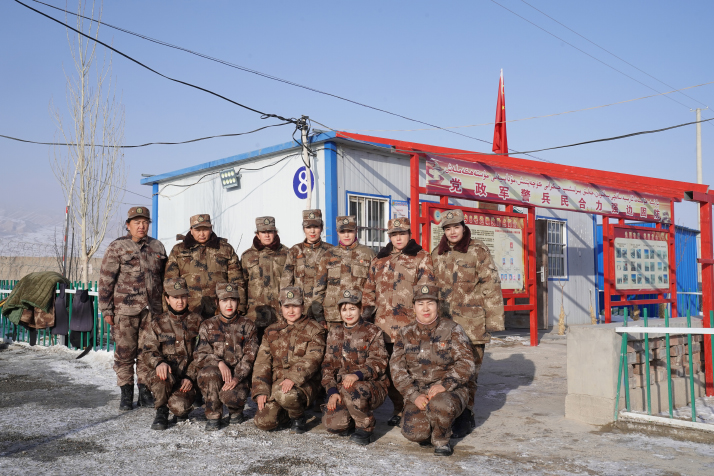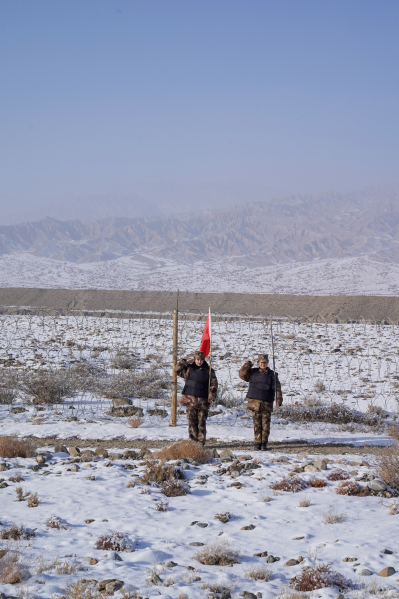| China |
| The life and work of an all-female patrol team stationed in Xinjiang's mountainous border area | |
|
|
 Part of the No.8 Border Patrol Team of Yamansu Township, Wushi, on January 24 (ZHANG WEI)
Arzigul Reyim, a villager from Yamansu Township, Wushi County, Aksu Prefecture in Xinjiang Uygur Autonomous Region, has been working as a border guard for five months. Together with 21 other female villagers, she is part of a border patrol team stationed high in the snowy mountains on the China-Kyrgyzstan border at an altitude of over 2,000 meters. Wushi is one of the 30-plus border counties and cities in Xinjiang. Located at the heart of the Eurasian continent, Xinjiang is situated on the northwest frontier of China, bordering eight countries: Mongolia, Russia, Kazakhstan, Kyrgyzstan, Tajikistan, Afghanistan, Pakistan and India. The border extends approximately 5,600 km, with tens of thousands of border patrol members, predominantly local villagers, along with police officers, devoted to carrying out border protection and security duties. Their combined contributions are invaluable and indispensable in upholding the safety and stability of the border areas. "Guarding the border is like guarding our home," Arzigul told Beijing Review. Daily life Established by the Aksu border management police department in 2017, the patrol team provides local women with an alternative job opportunity beyond traditional roles such as herding and homemaking, or migrant labor a long way from home. The daily duties of Arzigul and her colleagues include border patrols, during which they inspect the border wire mesh for any damage and promptly conduct repairs as needed. While some members are on patrol, some others work at the security booth, conducting checks on passing vehicles and pedestrians—typically including road construction workers, herders and travelers. Some members work night shifts, ensuring there are people on duty around the clock. Twenty-eight-year-old Arzigul decided to become a border guard so she could work close to home, making it easier for her to take care of her child and parents. To this day, many families in China live in multi-generational homes. Team members work two days and then have one day off, allowing them more time for family compared to other jobs. Arzigul used to work at factories in other counties, which made it difficult for her to be with family. The work itself was also more strenuous, with longer hours and sometimes lower pay. "Life isn't as stressful here [at the patrol team]," Arzigul said.  Border guards Arzigul Reyim (left) and Ayguzel Amantur on patrol in Wushi County, Aksu Prefecture in Xinjiang Uygur Autonomous Region, on January 24 (ZHANG WEI)
Ups and downs Life comes with its fair mix of challenges and joys up in these mountains. Despite the advantages, working near the desert and barren wasteland has its difficulties. The icy cold winter gales can sting the face during patrols and the women's daily one-hour formation training is akin to that of soldiers. The makeup they put on serves more for skin protection than for aesthetic reasons. "Though we've never served in the military, when we put on our border patrol officer uniforms and patrol the northwestern border of our homeland, it feels like we become female soldiers. We take great pride in safeguarding our country's borders," Arzigul said. Also, despite working with team members and communicating with passersby, sometimes life can get a little boring. "When we're on break, we chat, watch videos on Douyin (the Chinese version of TikTok), or go for a walk," Arzigul said. Ayguzel Amantur, a 23-year-old from the Kirgiz ethnic group who's been working at the border for little over a month, said she uses her spare time to learn standard Chinese in order to better be able to communicate with passersby, who are from all kinds of ethnic groups, and to watch short videos online. China is a multiethnic country and Xinjiang is home to all of the nation's 56 ethnic groups, with a population of 25.8 million, of which more than 11.6 million belong to the Uygur ethnic group. Among the region's minorities, more than 10 spoken and written languages are used. In the past, most residents in rural areas spent their lifetime in one place and were only able to speak their local language. This language barrier hindered their ability to venture beyond their villages and explore the rest of the country. In recent years, Xinjiang has been promoting education in standard Chinese, China's official language, while ethnic minority languages continue to be widely applied in a host of sectors, including the judiciary, administration, education, press and publishing, radio and television, and the Internet. Ayguzel expressed her aspiration to open a bakery in town one day. "Being proficient in standard Chinese and being bilingual are important for this business to thrive," she underlined. The patrol team has taken the initiative to plant trees around their station. "Before I came here, this was all desert and barren wasteland. But then we planted trees. We have greened this place," Patigul Mollak, a border patrol team member for five years and counting, said. "We also put up a grape vine trellis outside the door and painted it to really make the grapes stand out." To make the station a tad cozier and more comfortable, they adorned the walls with pictures and placed flowers in different spots. The station is also equipped with heating, air conditioning and household appliances such as a microwave and a TV set. The local labor union regularly supplies the team with food, other daily necessities and subsidies. "Here, we come from two ethnic groups: the Uygur and the Kirgiz. We love each other like sisters, all happy and content to be living here," Buniyazhan Hapiz, another dedicated team member, said. In the near future, the Biedieli Port, situated nearby and connecting China and Kyrgyzstan, is set to open. This development will likely reduce transportation time and logistics costs for international trade enterprises, as well as boost local tourism and cross-border tourism. The construction of highways along the border is expected to increase the influx of travelers. Arzigul mentioned that she and other colleagues are learning new skills and honing existing ones to better serve passersby and villagers from different ethnic groups while effectively securing the country's border. (Reporting from Xinjiang Uygur Autonomous Region) Copyedited by Elsbeth van Paridon Comments to luyan@cicgamericas.com |
|
||||||||||||||||||||||||||||
|
